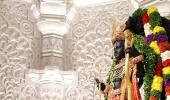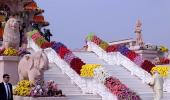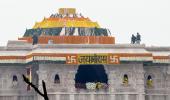'It is not his doing, but Rahul Gandhi is forced by circumstances.'
'In taking political decisions, everything has to get his clearance.'

Despite the shock administered to the INDIA bloc by Bihar Chief Minister Nitish Kumar crossing over to the National Democratic Alliance on Sunday, January 28, 2024, the Congress has continued with Rahul Gandhi's Bharat Jodo Nyay Yatra as if nothing has happened.
But is everything okay with the Opposition alliance that has announced dislodging Prime Minister Narendra Damodardas Modi from power in the 2024 elections?
In the first part of his interview to Syed Firdaus Ashraf/Rediff.com, Congress watcher and author Rasheed Kidwai explained why regional satraps like Nitish Kumar, Mamata Banerjee are not too enamoured of the way INDIA functions.
"Seat adjustments in the Lok Sabha elections was like making jalebi. The decision-making process was very tardy and the committees which they appointed had no big leaders. All the committee members did was go back and report to their respective leaders," Kidwai says in the second part of an illuminating interview.
When the United Progressive Alliance could defeat the popular Atal Bihari Vajpayee and his 'India Shining' campaign, why can't the Opposition defeat Mr Modi in 2024?
In 2004 there was a great deal of hope and optimism in the Opposition parties. This led to the coming together of all the anti-BJP parties in 2004.
In 2024, there is lack of hope and enthusiasm.
As I said earlier, the INDIA bloc is an assembly of people happy to be unhappy.
It consists of three groups.
There are regional allies saddled with power, which includes Mamata Banerjee, Hemant Soren and Arvind Kejriwal. Their stake in national politics is limited because these people are assured of their seat of power.
Secondly, you have parties which are out of power and want to be relevant like the Samajwadi Party in Uttar Pradesh, the Nationalist Congress Party of Sharad Pawar and the Shiv Sena (UBT).
In the third group you have parties who have no stake except giving political advice and ideological inputs. These political parties are groups of nobodies.
The Congress is the biggest party and it tries to represent itself as co-equal of 27 other INDIA parties.
This is not practical because somebody has to take up the role of leadership.
Take the example of seat adjustments in the Lok Sabha elections. It was like making jalebi. The decision-making process was very tardy and the committees which they appointed had no big leaders. All the committee members did was go back and report to their respective leaders.
In the Congress party, Mallikarjun Kharge had to get things vetted with Rahul Gandhi. He (Rahul) comes across as the villain in the entire process.
Are you saying that Rahul Gandhi is a villain in destroying the INDIA bloc?
Yes. It is not his doing, but he is forced by circumstances. In taking political decisions, everything has to get his clearance.
He is advised by Left liberals that he has to embark upon the second leg of the yatra, the Bharat Jodo Nyay Yatra. He is not able to articulate what this 'nyay' means.
For a majority of Indians, nyay means police stations and the courts or getting some kind of justice.
The 'nyay' that is being projected in the yatra, which is the Right to Livelihood or the Right to Information and various other things in a Constitutional democracy, is not being properly explained and understood by the masses. Therefore, there is a huge communication gap.
If Rahul Gandhi is away in Mizoram, Manipur and Assam fighting local battles, then obviously he cannot be in Delhi and do this INDIA bloc talks.
But people are turning up in large numbers to see him. If I am not mistaken, the Congress is targeting the 25 Lok Sabha seats in the North East.
Political correctness is no longer fetching votes or getting dividends. This is a subject worth research.
Opposition parties must find out why, even though they get so much traction, this never transfers into votes.
You take the example of the Lakhimpur Kheri case in Uttar Pradesh in 2022. Priyanka Gandhi made it a major campaign issue in the UP elections, but the Congress lost all the assembly seats in and around Lakhimpur Kheri very badly.
The same thing happened in Bhatta Parsaul (farmers' agitation) and Unnao (rape case) where the Congress lost the elections.
I can give you umpteen examples where political correctness is not fetching votes. The Congress put up bright and right candidates to contest the UP assembly elections in 2022, but many of them lost badly. This is the stark reality and the Congress is not able to take a call on emotive issues.
Hasn't India always voted on emotive issues rather than politically correct issues?
Precisely, and that is what I am saying, the Congress is not the same Congress which was that of earlier times, in the 1980s.
The Congress does not own up its own economic reforms, which is its biggest link to the Indian middle class.
Rahul Gandhi is talking more about the far left politics of welfare, etc.
It is not my view, but there is a growing perception that Rahul Gandhi is anti-industry by targeting 'hum do hamare do' (a reference to billionaires Gautam Adani and Mukesh Ambani).
Milind Deora said this before quitting the Congress.
Yes, there is merit in his statement.
If you see, when the Bofors issue came up the political individual was targeted and not the financial backers.
Whether it was the Mundhra-LIC financial scam during Jawaharlal Nehru's time, which was highlighted by his son-in-law Feroze Gandhi, or for that matter the Harshad Mehta scandal at the time of P V Narasimha Rao, it was Nehru and Rao who were targeted by the Opposition parties.
The Opposition did not attack Harshad Mehta, but attacked Narasimha Rao.
But Rahul Gandhi came up with 'Chowkidar Chor Hai', which targeted Mr Modi and backfired completely.
This was a good campaign from his side, but it lacked the backing of his party.
You see this Bharat Jodo Nyay Yatra and you will find civil society people in the forefront. Now, the problem is that the mainstay of Indian politics is the Indian middle class and not civil society.
You take the example of Rahul's great grandfather Jawaharlal Nehru who was able to go against the tide and convince the voters of India to vote for socialist and secular values.
Prime Minister Modi has highlighted matters related to faith and majoritarian politics to his advantage.
This is what I said at the beginning of the interview, what happened on January 22 in Ayodhya has created euphoria in the country.
The consecration ceremony of Ram Lalla has brought Prime Minister Modi into the driver's seat.
He has successfully completed the golden triangle. At one corner of this triangle is his politics of welfare, in the second corner is his alignment with the majority faith.
The third corner of his golden triangle is a combination of muscular and cultural nationalism.
This is bringing him high dividends in the politics of votes.
But there are issues like the job crisis. Thousands of Indians are queuing up for work in war-torn Israel, risking death rather than be jobless in India. Plus you have high inflation which hurts the poor and middle class.
Are these not issues for which people will vote on?
In India voters do not vote on either or subjects, they vote for a package.
A shrewd politician or political party has to know this and Prime Minister Modi has highlighted cultural nationalism which does not cost so much money. And it creates a lot of euphoria.
Is this not damaging the secular fabric of our country?
That may be a view. It is not the first time that religion and politics are being mixed in India.
You go back in history and check the demand for a Punjab state, Kashmir politics and even in 1984 (the elections).
The Congress cannot claim innocence on this count.
This was not true for Jawaharlal Nehru's Congress though, but Indira Gandhi blended religion with politics in a small manner during her tenure.
Now, this blending of religion with politics is in greater quantity.
So, you cannot say doing five percent of religion politics was right and doing 50 percent of religion politics is wrong.
The fact of the matter is that Prime Minister Modi has been able to highlight those issues and find traction.
The RSS (Rashtriya Swayamsevak Sangh) has been trying to do this for almost 100 years and they are successful now.
Politics is all about narrative and the will of the people. The same set of people did not buy RSS thinking post-Independence in Indian politics.











 © 2025
© 2025